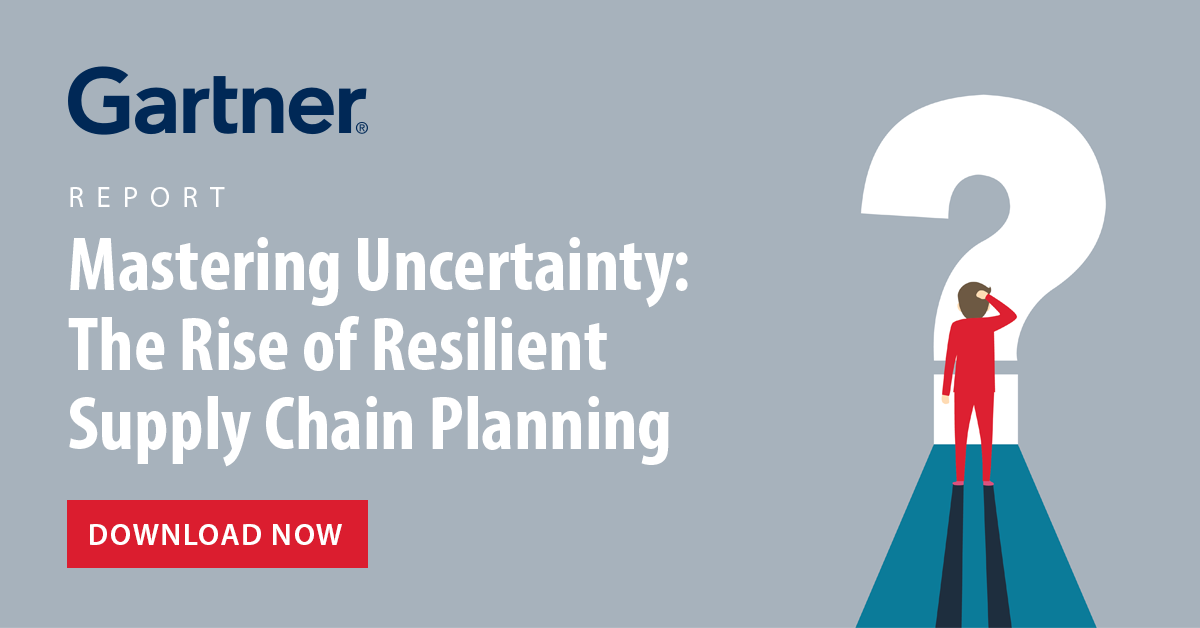In its report, Mastering Uncertainty: The Rise of Resilient Supply Chain Planning, Gartner argues that supply chain planning is in the midst of fundamental change. As emerging technological advancements such as artificial intelligence (AI) and machine learning (ML) coalesce, supply chain technology leaders have an opportunity to move from a traditional deterministic planning mode to a new, stochastic mode that Gartner calls “resilient planning.”
The drawbacks of deterministic planning
The report highlights some of the key shortcomings of the deterministic approach to supply chain planning, a type of planning which has its roots in the material requirements planning (MRP) algorithm that first appeared in the early 1960s. Deterministic planning involves forecasting demand and then using it as the basis for creating an accurate plan. The problem is, the successful execution of this kind of plan — and the achievement of its goals — depends on it being 100% accurate and therefore 100% executable. Given the high levels of uncertainty that supply chain planners have to contend with in an increasingly complex global environment, no plan can achieve this, the report argues, no matter how well conceived.
As global supply chains continue to grow in complexity and levels of uncertainty increase, deterministic planning has become less and less effective. The application of new supply chain planning technologies, such as advanced analytics and the adoption of a single data model to improve end-to-end collaboration, has enabled supply chain planners to increase the feasibility and accuracy of their plans incrementally. But Gartner argues that this is not enough. What’s needed is a shift to a new paradigm, one which helps companies conquer uncertainty while continuing to run their supply chains effectively.
What is resilient planning?
The answer for supply chain planners, according to Gartner, can be found in its resilient planning paradigm. Resilient planning involves the creation of “mid- and long-term plans that mitigate against uncertainty by ensuring the right degree of resiliency is built in so that short-term plans are more executable.”
As the report makes clear, resilient planning does not arise from the traditional, deterministic supply chain planning approach or its associated technology. Instead it depends on several key factors to drive the transition.
First, and perhaps most importantly for supply chain planners looking to make the shift, acquiring and deploying the latest emerging technologies is not sufficient. Instead, planners need to embrace an entirely new mindset. This will require challenging the way that planning is conducted in their organizations and also promoting an approach that embraces the uncertainty that’s inherent in the supply chain planning process.
Extracting maximum value from technology investments
Extracting the maximum value from technology investments is another key requirement for organizations as they evolve their supply chain planning from the deterministic to the resilient planning paradigm. Gartner recommends that supply chain leaders consider adopting four specific technology areas to help accelerate the shift to resilient planning:
- Leverage cloud platforms, particularly hyperscale cloud platforms like Amazon Web Services and Google Cloud Platform, to help planners make multiple predictions faster.
- Deploy planning analytics in line with the CORE (configure, optimize, respond, execute) model to help ensure that the different planning decisions required by resilient planning are supported.
- Use a digital supply chain twin to allow for better modeling and simulation of the physical supply chain and to align decision making across the supply chain.
- Utilize AI and/or ML to make better predictions and drive from unknown uncertainty toward known variability.
Learn more about mastering uncertainty by making the transition from deterministic to resilient supply chain planning. Read the full report: Mastering Uncertainty: The Rise of Resilient Supply Chain Planning, Tim Payne, Gartner 2020.






